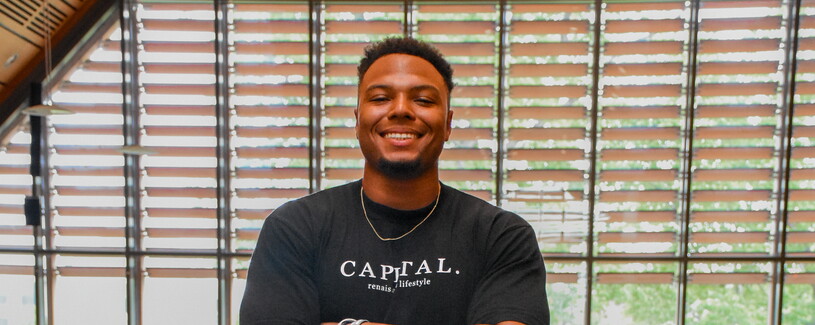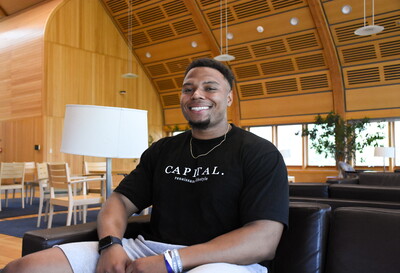Building Trust in the Clean Energy Field: Meet Marcus Mauney

The Planetary Solutions in Clean Energy - Internship and Fellowship Program (PSiCE) offers summer research and internship opportunities to students at Yale who are committed to advancing and pursuing a career in the clean energy field. This year we spoke with students in the initial cohort to learn about their inspiration, goals, and experience through the program.
The biggest obstacle to clean energy in lower-income and BIPOC communities is access. That’s according to Marcus Mauney, a senior student-athlete pursuing Environmental studies at Yale.
How does he know this? Because it's his story.
Marcus came to CBEY with a curiosity to understand how we can better intersect clean energy, the environment and social justice. He cited the COVID-19 Pandemic as the primary driver of this interest as disparities in his hometown of Gastonia, North Carolina became even more clear during that time.
“I think one thing that just really inspired me is around the Covid year 2020, a lot of social justice issues came about and really made me feel a call to action and say, ‘ok what can i do, what do i need to do and how can i integrate this into my passion and my studies?’ I began thinking and doing a little research focusing on environmental justice. Once I started taking classes in that area I realized there is a lot of overlap between social justice and environmental issues. There are a lot of things that need to be solved that affect a lot of people, especially low-income minorities.”
During his time as a PSiCE fellow, Marcus worked with PosiGen, a Connecticut residential solar energy company serving low-income communities. Marcus believed this was a perfect fit as the communities they served were reminiscent of his own and he had valuable insight to share.
“As a low-income minority myself, I feel like I can provide them with some perspective so they can not only understand what these communities are going through but also so that they can make a positive impact and change in these communities while also improving the environment.”
Marcus discussed one of the biggest obstacles in working with low-income communities: building trust. Working with PosiGen, he was able to reach low-income residents on how clean energy could not only be beneficial financially in the long run but also combat issues of social justice.
“A lot of energy disparities exist in low-income communities and it forces them to have to sacrifice either 50% or more of their total income to energy. One of the things that interested me with the work I was doing with PosiGen is that they are focused on providing low-income communities with clean energy while also helping them improve their financial situation. Many people don't understand how these disparities can affect minority communities. Energy costs can take away a lot from their personal income so they can’t elevate themselves.”
As a member of Yale’s Bulldog Sustainability group, Marcus also focuses on sustainability on the campus by spreading awareness at sporting events on campus. A defensive line for the varsity football team at Yale and a member of the 2019 Ivy League Championship team, Marcus says the trash left at events is unimaginable. This is why the group educates fellow students on how their trash can be harming the environment. Marcus says that it would be a good idea to eventually expand the work of the Bulldog Sustainability group into the wider New Haven community to increase awareness.
Marcus credits the CBEY team for the opportunity to indulge in his passions and forge his path in the clean energy and social justice fields.
CBEY is proud to congratulate Marcus on his work as an inaugural Planetary Solutions in Clean Energy fellow.
